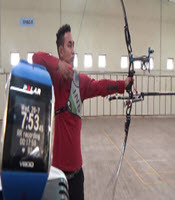Heart Rate Values During Shooting is a Field-Side Performance Analysis Tool in Archery-A study of Elite Indian Archers
DOI:
https://doi.org/10.61838/kman.intjssh.3.1.4Keywords:
Athletic Performance, Attention, Heart Rate Control, Motor SkillAbstract
Background: Heart rate value during different phases of archery shooting has been correlated with performance scores. Objectives: This study was done to ascertain this and with an aim of real-time objective field assessment of training and performance among Elite Indian archers. Methods: The study was conducted in Indoor archery hall as per World Archery Association rules with Cross-sectional study design. Seven volunteered male elite archers (mean age: 23.9 ± 3.00 years, mean experience: 8.5 ± 2.35 years) shot 30 arrows each (n = 210) with simultaneous recording of heart rate, score and shooting action. Release frames were identified by slow motion analysis. Heart rate values during release (0 s), every second for 5 seconds before and after the release of arrow were noted and analyzed. One-way ANOVA test was employed. Level of significance was set at P < 0.05. Results: One-way ANOVA of heart rate values at all 11 time-points between the three scores 8, 9 and 10 showed significant differences from -5 s to -1 s with heart rate values at score 8 being significantly higher (P < 0.05). Heart rate decreased significantly from -5 s to +1 s and increased further. Conclusions: Heart rate deceleration was found in aiming and release phases of shooting. The elicited change in trend of the heart rate values can be used as a field-tool for training archers. Future studies on novice archers would help us understand the change in trend with training and experience in the sports.Downloads

Downloads
Published
2020-02-05
Issue
Section
Articles
How to Cite
Guru, C. S., Krishnan, A., Mahajan, U., & Sharma, D. (2020). Heart Rate Values During Shooting is a Field-Side Performance Analysis Tool in Archery-A study of Elite Indian Archers. International Journal of Sport Studies for Health, 3(1), 21-26. https://doi.org/10.61838/kman.intjssh.3.1.4




